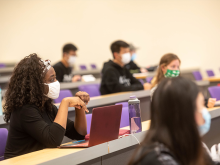Outreach programs that offer a taste of real-world science and pair secondary students with enthusiastic young researchers are key to promoting careers in science and technology, according to UBC researchers.
In a paper published this week in PLoS Computational Biology, UBC researchers document their work on the Genomics Field Trip Program hosted at the Michael Smith Laboratories (MSL). Joanne Fox, Jennifer McQueen and Jody Wright outline the benefits of research-based field trips, offering a blueprint for designing science outreach programs.
"Genomics is important because students will deal with challenging questions and they need to be informed and science-literate," says Fox, a faculty member at the Michael Smith Laboratories. "For example, they may have their personal genome sequence and they may have to decide who has access to that information."
The Genomics Field Trip program encourages exploration of the sciences through a full day genomics experience which takes place at the MSL laboratories. Program instructors are typically UBC graduate students who benefit from the experience by developing their ability to communicate scientific ideas to the general public. They also develop skills in lesson design and delivery, allowing them to enhance their instructional skills, something that does not always occur in teaching assistantship positions.
Fox hopes the success of the Genomics Field Trip Program will inspire other institutions to develop similar programs. The recommendations included in her paper can be used as a blueprint for science programs and an online genomics toolkit provides valuable information for lesson plans.
"This type of program helps graduate students remember why science is so exciting, and in turn inspires the next generation of scientists," Fox explains.
The Genomics Field Trip Program has received funding from the PromoScience Program of the Natural Sciences and Engineering Research Council of Canada.
To read the paper, visit PLoS Computational Biology: www.ploscompbiol.org/article/info:doi/10.1371/journal.pcbi.1002636
To access the Genomics Field Trip toolkit or to book a field trip: www.bioteach.ubc.ca/genetics-fieldtrips/genomics-field-trips-for-second…
Musqueam First Nation land acknowledegement
We honour xwməθkwəy̓ əm (Musqueam) on whose ancestral, unceded territory UBC Vancouver is situated. UBC Science is committed to building meaningful relationships with Indigenous peoples so we can advance Reconciliation and ensure traditional ways of knowing enrich our teaching and research.
Learn more: Musqueam First Nation
Faculty of Science
Office of the Dean, Earth Sciences Building2178–2207 Main Mall
Vancouver, BC Canada
V6T 1Z4


